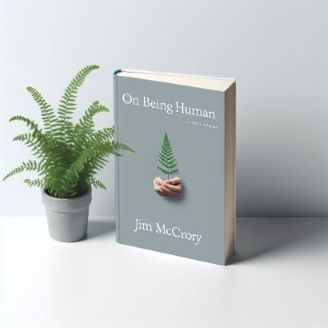
Why Do I Bother To Write?
Like most days over the past four years, I sit to write. The blank page often stays blank, stirring that familiar anxiety, especially when a deadline looms. The clock stifles creativity. The page stares back, unyielding. Sentences surface and audition, but most are quickly dismissed. For every twenty, one might be acceptable. I hope for that spine-tingling line you find in a Tranströmer poem. The iambic pulse in my poetry. The quiet clarity of Mankell. A whole world contained in a Lydia Davis paragraph. But nothing worthy emerges.
So, I go down, make coffee, and turn on the radio. A song catches my thoughts and sends shivers up my spine. A song about a man walking under African skies.
I dwell on the imagery. The sense of place. The tantalising syntax and its gentle, fluid rhythm. How the artist’s words unfurl like a film in my mind. Where did such lyrical magic come from? Was it composed in minutes, or did it take weeks? I look it up. The songwriter’s reflections are absent. I return to the screen more uneasy than before. My short foray into the cyber-hive under the guise of research has only distracted me. The clock ticks louder now. I sit back at my desk, disheartened, like Pasternak’s figure in The Passion of Creation.
So why put myself through this struggle? Why not ride a mountain bike around the Alps, walk the Camino de Santiago, or join my local philosophical society?
Well, It happened like this:
I originally set out to become a social psychologist. I had a deep desire to understand human nature. But like many sciences, psychology is a battleground of contradicting theories. What is learned today is often unlearned tomorrow. It felt like a Sisyphean task.
Yet I carried something else with me: a lifelong fascination with words that resist translation. Swedish lagom, German Torschlusspanik, Danish hygge. Each offered a glimpse into the soul of a culture. There are stories of being human in these words.
Years later, when life quieted down, I took my notebooks to the Philippines. My wife and I were staying in Pagudpud, a northern coastal resort. Each morning, I would rise early, walk to the breakfast hut, and choose a seat where only the ocean separated me from China. There, I wrote nonfiction pieces shaped by these cultural insights.
In the late afternoons, children would come with trays of handmade bracelets and trinkets, their wide eyes gently pleading. When I bought from one, others soon followed. A Western visitor with deep pockets became a community event. It reminded me of the sociological idea of Gemeinschaft—a society where the welfare of the group outweighs individual gain. I was learning social psychology not from textbooks, but from life itself.
Later, I visited a university and asked for reading recommendations. The social science department kindly gave me access to their library. I read widely—fiction and nonfiction that deepened my understanding of people and place. And so, this is where my writing began. Not as a career, but as a return to those earlier questions about what it means to be human.
But writing soon became more than inquiry. More than storytelling. It became a mirror of mortality.
In this year of 2025, I write because I’m dying. Not imminently, but inevitably. Neuroendocrine cancer will one day win the battle between life and death.
Is that reason enough to write?
I first read about Gustaf Hjortberg in an essay by Henning Mankell. Inside a small church in Släp, on Sweden’s west coast, hangs a portrait unlike any other. Long before the invention of photography, the wealthy commissioned paintings. This one feature Hjortberg—a clergyman—and his wife Hanna, surrounded by their fifteen children.
He stands with one foot in faith and the other in science. Behind him hangs a crucifix inscribed with 1 Timothy 1:15. On the table beside him lie navigational tools, a globe, and an academic paper. Sample jars on the shelf point to his work as a student of Linnaeus. A row of African spears, a lemur on the floor, and stuffed animals hanging from the ceiling reveal a well-travelled man.
Yet the portrait is playful. His shoe lies casually on the floor. The boys wear half-smiles. The girls are more reserved, perhaps reflecting Lutheran modesty.
Then comes the detail that halts the breath: six of the fifteen children are dead. Yet they appear in the painting, faint and shadowy, hovering between worlds. Not fully gone. No other image captures so poignantly the human urge not to leave life behind.
And this is why I write. I want to be remembered. I want to leave a mark that says, I was here. Writing is my defiance of death.
I often think about Hjortberg. Did the children die during his long absences? What caused him to include them in the painting?
And why that verse: “Christ Jesus came into the world to save sinners, of whom I am the worst”? Was it guilt—or humility? Koine Greek, the language of the New Testament, had no word for humility. Paul coined tapeinophrosune—to make the mind low.
Perhaps that’s what Hjortberg intended. Perhaps the relaxed expressions of the children reflect warmth in their father’s presence. It takes humility to commission a painting that future generations might deem strange. But this was the norm of the day. And yet, I walk through my local graveyard and see portraits of children who have passed, surrounded by messages of heartbreak and flowers.
That portrait reminds me of another truth: the dead cannot defend themselves. Unlike the characters in Máirtín Ó Cadhain’s The Dirty Dust, the departed cannot answer accusations, correct myths, or confront gossip.
Identity is something we help shape, but do not fully own. We know whether we are kind or vain, broken or brave. But once we are gone, our image is left in the hands of others. Skeletons—real or imagined—are dragged from cupboards. So I write to leave a record of who I am. Essays that, if read carefully, might reveal me. An apologia pro vita sua, you might say.
I also write because I mourn something that never quite existed. The Germans call it Fernweh—a homesickness for a place never visited.
I felt it when my music teacher played Grieg’s Morning, speaking of trolls, Peer Gynt, and the Scandinavian landscape. Norway felt like where I should have been born.
I feel it again watching The Children of Noisy Village, based on Astrid Lindgren’s books. The village is simple, kind, and imaginative. A place I long for, though it lives only in fiction.
But Fernweh runs deeper.
As I write, the Russian invasion of Ukraine rages on. Body counts appear in news columns like stock indexes. Millions are displaced—tired, grieving, and stateless. In UK, more and more people are living on the streets. In winter, zero degrees and under. Dickens lives again.
So why write?
Because I stand at the Wailing Wall of humanity. Writing brings release. But more than that, it becomes a land where reality and hope can meet. Fernweh, you might say.
Maya Angelou once said that when she began a project, she brought with her everyone who had ever been kind to her. I, too, write about the nobler qualities of human nature: kindness, hope, empathy, and unconditional love.
I write to make sense of life. To hold its sorrows and its wonders up to the light. To ask what it means to be human—and to try, through words, to answer
Hjortberg Portrait : https://preview.redd.it/7smofare5dw71.jpg?width=1080&crop=smart&auto=webp&s=418f545f1586c68c59f94f080d3e4e3449f93ea9
Paul Simon - Under African Skies (Live from The African Concert, 1987)
Image generated with the assistance of Microsoft Copilot

